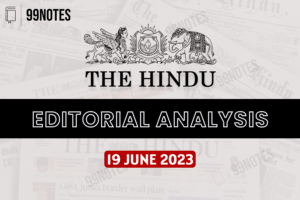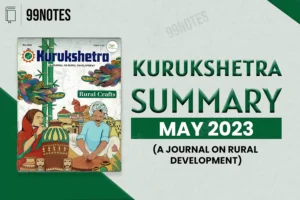19 June 2023 : PIB
PRESS INFORMATION BUREAU
19-June-2023
Daily Current Affairs For UPSC ,The PIB ( Press Information Bureau )
1. PM congratulates Gita Press, Gorakhpur on being conferred the Gandhi Peace Prize 2021.
Topic: GS3 – Awards.
Context:
-
-
-
The Prime Minister, Shri Narendra Modi, congratulated Gita Press, Gorakhpur on being awarded the Gandhi Peace Prize 2021.
-
Gita Press has been recognized for its commendable work over the last 100 years.
-
The organization has contributed significantly to social and cultural transformations among the people.
-
-
About Gandhi Peace Prize:
-
-
-
The Gandhi Peace Prize is an international award given by the Government of India to individuals and organizations that have made notable contributions to promoting peace, harmony, and non-violence.
-
The prize was established in 1995 on the occasion of the 125th birth anniversary of Mahatma Gandhi, the renowned leader of India’s independence movement.
-
The selection of the recipients is made by a jury consisting of the Prime Minister of India, the Leader of the Opposition in the Lok Sabha (the lower house of the Indian Parliament), the Chief Justice of India, and two eminent persons chosen by the President of India.
-
The award includes a cash prize, a citation, and a plaque. Over the years, the prize has been presented to individuals, organizations, or movements from various countries for their efforts in promoting peace, non-violence, and social upliftment.
-
Some of the notable recipients of the Gandhi Peace Prize include Nelson Mandela, the former President of South Africa, Archbishop Desmond Tutu, the spiritual leader of South Africa, and organizations like the Ramakrishna Mission and the Bharatiya Vidya Bhavan.
-
The Gandhi Peace Prize aims to recognize and honor the contributions of individuals and organizations towards the ideals that Mahatma Gandhi espoused during his lifetime, such as non-violence, truth, social justice, and harmony among different communities. It serves as a tribute to Gandhi’s philosophy and legacy, emphasizing the importance of peace and non-violence in today’s world.
-
-
Source: https://pib.gov.in/PressReleseDetail.aspx?PRID=1933297
2. Gross Direct Tax collections for Financial Year (FY) 2023-24 register a growth of 12.73%.
Topic: GS3 – Indian economy.
Context:
-
-
-
The net direct tax collections for the fiscal year 2023-24 have shown a growth of 11.18%.
-
The gross collection of direct taxes for FY 2023-24 stands at Rs. 4,19,338 crore, representing a growth of 12.73% compared to the previous fiscal year.
-
-
Reasons for increase in tax collections (Direct and Indirect taxes) in India:
-
-
-
Economic growth: There has been overall economic growth in India, contributing to higher direct tax collections.
-
Improved tax compliance: Efforts by the government to enhance tax compliance, such as stricter enforcement, effective tax administration, and measures to curb tax evasion, have lead to higher tax collections.
-
Expansion of the tax base: The government’s efforts to widen the tax base by bringing more individuals and businesses into the tax net has contributed to increased tax collections. Steps like mandatory linking of Aadhaar (unique identification number) with tax filings and increased scrutiny of high-value transactions aim to identify potential taxpayers and reduce tax evasion.
-
Better data analytics and information sharing: The use of advanced data analytics tools and improved information sharing among government agencies can help identify non-compliant taxpayers and prevent tax evasion. This can lead to higher tax collections.
-
The economic recovery: The Indian economy has been recovering strongly in recent months, with GDP growth picking up to 8.7% in the third quarter of 2022. This has led to an increase in incomes, which has boosted tax collections.
-
The implementation of new tax reforms: The government has implemented a number of new tax reforms in recent years, such as the Goods and Services Tax (GST) and the Income Tax Act, 2016. These reforms have made the tax system more efficient and transparent, which has helped to increase compliance and collections.
-
The digitization of the tax system: The government has been making significant investments in the digitization of the tax system. This has made it easier for taxpayers to file their returns and pay their taxes, which has also helped to boost collections.
-
-
Challenges that still exist for tax collection:
While there have been increases in direct tax collections in India, several challenges still exist that can hinder further progress. Some of these challenges include:
-
-
-
Tax evasion and avoidance: Tax evasion and avoidance continue to be significant challenges in India. Some individuals and businesses employ various strategies to evade taxes or reduce their tax liabilities through illicit means.
-
Informal economy: A significant portion of economic activities in India operates in the informal sector, where transactions often go unreported. This informal economy poses challenges in capturing taxable income and expanding the tax base.
-
Complex tax laws: India’s tax laws can be complex and challenging to interpret, leading to confusion and potential errors in tax compliance.
-
Tax administration inefficiencies: Inefficiencies in tax administration, such as delays in processing tax returns, issuing refunds, and resolving disputes, can create frustrations for taxpayers and impact compliance.
-
Tax litigation and dispute resolution: The high volume of tax litigation and prolonged dispute resolution processes in India contribute to uncertainty and administrative burdens for taxpayers.
-
Taxation of agriculture income and wealth: Agriculture income is generally exempt from income tax in India. However, concerns exist about potential misuse of this exemption, leading to underreporting of income and tax evasion.
-
-
Way Forward:
-
-
-
Strengthen tax administration: Enhance the capacity and efficiency of tax authorities through training programs, modernization of processes, and adoption of technology-driven solutions. This can help streamline tax collection, improve compliance, and reduce administrative burdens.
-
Simplify tax laws: Simplify tax laws and regulations to make them more transparent and easily understandable. This can reduce ambiguity, enhance compliance, and minimize disputes.
-
Promote digitalization: Continue to promote digitalization of tax processes, such as online filing and payment systems, to simplify tax compliance and minimize human errors.
-
Target tax evasion: Implement stricter measures to detect and penalize tax evasion – conducting data-driven analysis, and improving information sharing among different government agencies. This can help identify non-compliant taxpayers and discourage tax evasion practices.
-
Enhance taxpayer education and awareness: Conduct awareness campaigns and provide educational resources to educate taxpayers about their rights, obligations, and benefits of tax compliance. This can foster a culture of voluntary compliance and encourage individuals and businesses to fulfill their tax responsibilities.
-
Expand the tax base: Explore strategies to bring more individuals and businesses into the tax net, including improved identification of potential taxpayers, targeted outreach programs, and incentivizing voluntary tax registration.
-
Expedite dispute resolution: Strengthen dispute resolution mechanisms, such as tax tribunals and alternative dispute resolution methods, to expedite the resolution of tax-related disputes. This can reduce litigation backlogs, enhance taxpayer confidence, and ensure timely resolution of tax-related matters.
-
International cooperation: Enhance cooperation with other countries to combat tax evasion and promote information exchange. This can help in tracking offshore assets and income of Indian taxpayers and ensure that they fulfill their tax obligations.
-
Continual evaluation and reform: Regularly evaluate the effectiveness of tax policies, procedures, and enforcement mechanisms and make necessary reforms based on the evolving economic and social dynamics. This can ensure that the tax system remains relevant, fair, and conducive to economic growth.
-
-
Steps taken by Indian government in this regard:
-
-
-
Tax reforms: The introduction of the Goods and Services Tax (GST) in July 2017 aimed to streamline indirect taxation and reduce tax evasion. It replaced multiple indirect taxes with a unified tax system, improving tax compliance and increasing tax revenues.
-
Income tax return simplification: The government has focused on simplifying the income tax return filing process by introducing online platforms, pre-filled tax forms, and reducing the number of mandatory fields.
-
Faceless assessment and appeals: The government has introduced the concept of faceless assessment and faceless appeals to reduce discretionary powers, minimize corruption, and ensure fair and transparent tax assessments and appeals.
-
Use of technology: Initiatives like the Centralized Processing Center (CPC), e-assessment, and electronic verification codes (EVCs) have streamlined tax processes, reduced manual intervention, and enhanced efficiency.
-
-
-
-
-
Anti-tax evasion measures: The government has implemented measures to curb tax evasion, such as mandatory linking of Aadhaar (unique identification number) with tax filings, stricter reporting requirements for high-value transactions, and increased scrutiny of tax evasion cases.
-
International tax cooperation: The government has actively participated in international efforts to combat tax evasion and promote tax transparency. India has entered into bilateral and multilateral agreements for exchange of tax-related information and has joined initiatives like the Base Erosion and Profit Shifting (BEPS) framework.
-
Launch of the Vivad se Vishwas Scheme: The Vivad se Vishwas Scheme is a scheme that allows taxpayers to settle their outstanding tax liabilities with the government at a discounted rate. This scheme has been successful in encouraging taxpayers to come forward and settle their dues.
-
-
Conclusion:
These steps demonstrate the Indian government’s commitment to enhancing direct tax collections, improving tax administration, and promoting tax compliance. Continued efforts in these areas, along with ongoing reforms, are essential to further strengthen the tax system and ensure sustainable revenue generation for the country’s development.
Source: https://pib.gov.in/PressReleseDetail.aspx?PRID=1933298
3. A National Conference on ‘Foundational Literacy and Numeracy’ held Pune
Topic: GS3 – Education
Context:
-
-
-
A pre-event National Conference on ‘Foundational Literacy and Numeracy’ was conducted in Pune as a lead-up to the 4th Education Working Group Meeting of the G-20.
-
-
What is Foundational Literacy and Numeracy:
-
-
-
Foundational Literacy and Numeracy refers to the fundamental skills of reading, writing, and basic numeracy that are essential for a person’s overall development and lifelong learning.
-
It is the ability to comprehend and communicate through written language and to perform basic mathematical calculations
-
-
Status of foundational literacy and numerous in India:
-
-
-
The percentage of children in Class III who can read a simple text with comprehension has declined from 27.3% in 2018 to 20.5% in 2022.
-
The percentage of children in Class V who can solve simple math problems has also declined from 50.5% in 2018 to 42.8% in 2022.
-
Girls lagging behind: The percentage of girls in Class III who can read a simple text with comprehension is 17.4%, compared to 23.6% for boys.
-
This is a concerning trend, as it suggests that children are not learning the basic skills they need to succeed in school and in life.
-
-
Significance of Foundational Literacy and Numeracy:
-
-
-
Basic building blocks of education: Foundational literacy and numeracy serve as the building blocks for acquiring advanced knowledge and skills. Without these foundational skills, individuals may struggle to grasp complex concepts in various subjects and may face difficulties in higher education and professional development.
-
Empowerment and inclusion: It enables them to access information, engage in critical thinking, express their thoughts and ideas, and make informed decisions.
-
Economic development: They enable individuals to acquire job-related skills, participate in the workforce, and contribute effectively to the economy.
-
Lifelong learning: Foundational literacy and numeracy support individuals in navigating a rapidly changing world and developing critical skills for the 21st-century workforce.
-
Sustainable development: Foundational literacy and numeracy are vital for achieving the Sustainable Development Goals (SDGs) set by the United Nations. They are closely linked to several SDGs, such as quality education (SDG 4), gender equality (SDG 5), reduced inequalities (SDG 10), and decent work and economic growth (SDG 8).
-
Social integration and citizenship: They enable individuals to participate meaningfully in democratic processes, understand their rights and responsibilities, engage in civic activities, and contribute to the betterment of their communities.
-
-
Reasons for poor Foundational Literacy and Numeracy in India:
-
-
-
Low quality of early childhood education: Many children in India do not have access to quality early childhood education. This means that they start school without the basic skills they need to succeed.
-
High levels of poverty: Poverty is a major barrier to education in India. Children from poor families are more likely to drop out of school, and they are also more likely to have lower levels of literacy and numeracy.
-
Gender inequality: Girls are more likely to be denied access to education than boys. They are also more likely to drop out of school, and they are more likely to have lower levels of literacy and numeracy.
-
Inadequate teacher training: Many teachers in India do not have the training they need to teach foundational literacy and numeracy effectively.
-
Inadequate learning materials. Many schools in India do not have the resources they need to provide effective instruction in foundational literacy and numeracy
-
-
The government of India has taken some steps to address the problem of poor foundational literacy and numeracy. These include:
-
-
-
The Sarva Shiksha Abhiyan (SSA): The SSA is a government program that aims to provide universal elementary education in India. The SSA includes a number of initiatives to improve foundational literacy and numeracy, such as the provision of training for teachers and the development of learning materials.
-
The National Education Policy (NEP): The NEP is a new education policy that was launched in 2020. The NEP places a strong emphasis on foundational literacy and numeracy. It includes a number of measures to improve the quality of early childhood education, such as the expansion of pre-school education and the provision of training for early childhood educators.
-
-
Some other measures that can be taken to improve the situation:
-
-
-
Strong policy frameworks: Governments need to develop and implement robust policy frameworks that include clear targets, guidelines, and strategies to ensure systematic focus on these skills.
-
Curriculum and assessment reforms: The curriculum should be designed to develop age-appropriate reading, writing, and numeracy skills, with a focus on practical application and critical thinking
-
Quality teacher training: Comprehensive and ongoing teacher training programs should be implemented to equip educators with the necessary skills, instructional techniques, and assessment methods.
-
Resource allocation: Sufficient resources should be allocated to ensure adequate infrastructure, teaching materials, and learning resources that support the development of foundational literacy and numeracy skills.
-
Early childhood education:. Governments should invest in expanding access to quality pre-primary education, ensuring that children receive early exposure to language and numeracy activities in a stimulating and nurturing environment.
-
Community involvement: Engaging parents, caregivers, and the broader community is crucial for promoting foundational literacy and numeracy.
-
Monitoring and evaluation: Regular monitoring and evaluation systems should be established to track progress in foundational literacy and numeracy. Data collection and analysis can help identify gaps, measure outcomes, and inform evidence-based decision-making and policy adjustments.
-
-
Conclusion:
By implementing these measures, India can make significant progress in enhancing foundational literacy and numeracy skills, ensuring that all individuals have a strong educational foundation for their personal and professional growth.
Source: https://pib.gov.in/PressReleseDetail.aspx?PRID=1933257
For Enquiry

19 June 2023 : PIB

19 June 2023 : The Hindu Editorial

19 June 2023 : Daily Current Affairs

Kurukshetra Summary, May 2023

17 June 2023 : Indian Express

17 June 2023 : Daily Quiz

16 June 2023 : Daily Quiz

15 June 2023 : Daily Quiz

14 June 2023 : Daily Quiz

13 June 2023 : Daily Quiz
PIB 19 June 2023 : PIB The Hindu Editorial
12-May-2023
Daily Current Affairs For UPSC ,The Hindu Editorial Summary
Facebook-f
Twitter
Youtube
1.Marriage…
The Hindu 19 June 2023 : The Hindu Editorial The Hindu Editorial
19-June-2023
Daily Current Affairs For UPSC ,The Hindu Editorial Summary
Facebook-f
Twitter
Youtube
1….
Daily Current Affairs 19 June 2023 : Daily Current Affairs DAILY CURRENT AFFAIRS
19-June-2023
Daily Current Affairs For UPSC ,Daily Current affairs of The hIndu…
kurukshetra summary Kurukshetra Summary, May 2023 Chapter 1: Potential of the Rural Crafts
Introduction
India has an affluent tradition of rural crafts…
Indian Express 17 June 2023 : Indian Express Indian Express
17-June-2023
The Indian Express, CSE candidates can stay informed about current events…
Daily Quiz 17 June 2023 : Daily Quiz 17 june 2023 : Daily Quiz…
Daily Quiz 16 June 2023 : Daily Quiz 16 June 2023 : Daily Quiz…
Daily Quiz 15 June 2023 : Daily Quiz 15 June 2023 : Daily Quiz…
Daily Quiz 14 June 2023 : Daily Quiz 14 June 2023 : Daily Quiz…
Daily Quiz 13 June 2023 : Daily Quiz 13 June 2023 : Daily Quiz…





